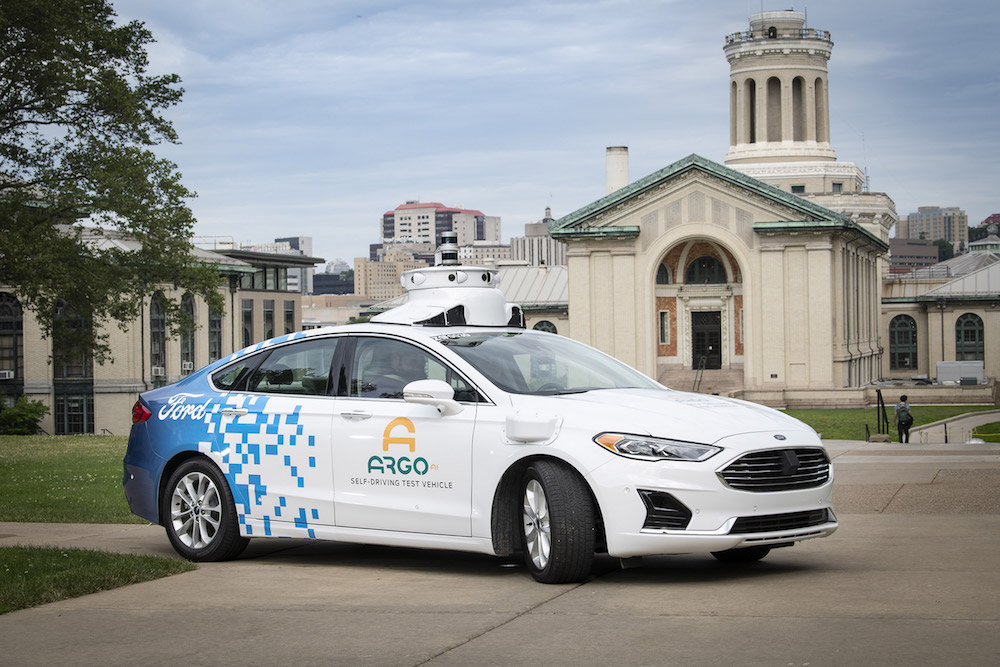Source:- therobotreport.com
Argo AI, a Pittsburgh-based autonomous vehicle company, has donated $15 million to Carnegie Mellon University (CMU) to fund a new research center. The Carnegie Mellon University Argo AI Center for Autonomous Vehicle Research will “pursue advanced research projects to help overcome hurdles to enabling self-driving vehicles to operate in a wide variety of real-world conditions, such as winter weather or construction zones.”
Argo was founded in 2016 by a team with ties to CMU (more on that later). The five-year partnership between Argo and CMU will fund research into advanced perception and next-generation decision-making algorithms for autonomous vehicles. The center’s research will address a number of technical topics, including smart sensor fusion, 3D scene understanding, urban scene simulation, map-based perception, imitation and reinforcement learning, behavioral prediction and robust validation of software.
“We are thrilled to deepen our partnership with Argo AI to shape the future of self-driving technologies,” CMU President Farnam Jahanian said. “This investment allows our researchers to continue to lead at the nexus of technology and society, and to solve society’s most pressing problems.”
In February 2017, Ford announced that it was investing $1 billion over five years in Argo, combining Ford’s autonomous vehicle development expertise with Argo AI’s robotics experience. Earlier this month, Argo unveiled its third-generation test vehicle, a modified Ford Fusion Hybrid. Argo is now testing its autonomous vehicles in Detroit, Miami, Palo Alto, and Washington, DC.
Argo last week released its HD maps dataset, Argoverse. Argo said this will help the research community “compare the performance of different (machine learning – deep net) approaches to solve the same problem.
“Argo AI, Pittsburgh and the entire autonomous vehicle industry have benefited from Carnegie Mellon’s leadership. It’s an honor to support development of the next-generation of leaders and help unlock the full potential of autonomous vehicle technology,” said Bryan Salesky, CEO and co-founder of Argo AI. “CMU and now Argo AI are two big reasons why Pittsburgh will remain the center of the universe for self-driving technology.”
Deva Ramanan, an associate professor in the CMU Robotics Institute, who also serves as machine learning lead at Argo AI, will be the center’s principal investigator. The center’s research will involve faculty members and students from across CMU. The center will give students access to the fleet-scale data sets, vehicles and large-scale infrastructure that are crucial for advancing self-driving technologies and that otherwise would be difficult to obtain.
CMU’s other autonomous vehicle partnerships
This isn’t the first autonomous vehicle company to see potential in CMU. In addition to Argo AI, CMU performs related research supported by General Motors, Uber and other transportation companies.
Its partnership with Uber is perhaps CMU’s most high-profile autonomous vehicle partnership, and it’s for all the wrong reasons. In 2015, Uber announced a strategic partnership with CMU that included the creation of a research lab near campus aimed at kick starting autonomous vehicle development.
But that relationship ended up gutting CMU’s National Robotics Engineering Center (NREC). More than a dozen CMU researchers, including the NREC’s director, left to work at the Uber Advanced Technologies Center.
Argo’s connection to CMU
As mentioned earlier, Argo’s co-founders have strong ties to CMU. Argo Co-founder and president Peter Rander earned his masters and PhD degrees at CMU. Salesky graduated from the University of Pittsburgh in 2002, but worked at the NREC for a number of years, managing a portfolio of the center’s largest commercial programs that included autonomous mining trucks for Caterpillar. In 2007, Salesky led software engineering for Tartan Racing, CMU’s winning entry in the DARPA Urban Challenge.
Salesky departed NREC and joined the Google self-driving car team in 2011 to continue the push toward making self-driving cars a reality. While at Google, Bryan he responsible for the development and manufacture of their hardware portfolio, which included self-driving sensors, computers and several vehicle development programs.
Brett Browning, Argo’s VP of Robotics, received his Ph.D. (2000) and bachelor’s degree in electrical engineering and science from the University of Queensland. He was a senior faculty member at the NREC for 12-plus years, pursuing field robotics research in defense, oil and gas, mining and automotive applications.
